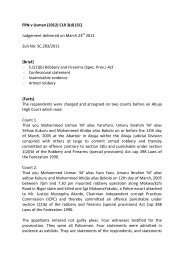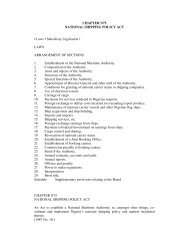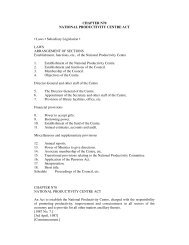Suberu v State.pdf - Aksjlegalresource.com
Suberu v State.pdf - Aksjlegalresource.com
Suberu v State.pdf - Aksjlegalresource.com
Create successful ePaper yourself
Turn your PDF publications into a flip-book with our unique Google optimized e-Paper software.
offence. He submitted that by Section 27(3) of the Evidence Act, Exhibit 1 is not<br />
evidence against the 3rd accused who denied <strong>com</strong>mitting the offence. He urged that the<br />
3rd accused be discharged.<br />
Mr. Jamil, the Chief Legal Officer for the prosecution, at page 46 lines 6-7 of the<br />
transcript record of appeal <strong>com</strong>mendably stated thus:-<br />
"We agree with the No-Case submission of learned Counsel for the 3rd accused."<br />
On 28/5/2007, the learned trial Judge, in his ruling, overruled the No-Case<br />
submission relying particularly on Exhibit '1’ statement of the 4th accused person<br />
wherein the name of the 3rd accused was mentioned.<br />
{Issue}:<br />
Whether the learned Justices of the Court of Appeal were right to hold that a prima<br />
facie case had been established against the Appellant.<br />
{Held-Summary}: Unanimously allowing the appeal.<br />
1. No-case submission - purport of<br />
It is certain that a submission that there is no-case to answer should only be<br />
upheld if any of the two situations stated hereunder prevails at the end of the<br />
prosecution's case:-<br />
(a) When there has been no evidence connecting the accused person with<br />
the alleged offence (s).<br />
(b) When the evidence adduced by the prosecution has been so discredited as<br />
a result of cross-examination or Is manifestly unreliable that no<br />
reasonable tribunal could safely convict on it.<br />
The purport of a no-case submission when made on behalf of an accused<br />
person is that the trial Court is not called upon at that stage to express any<br />
opinion on the evidence before it. The Court is only called upon to take note<br />
and to rule accordingly that there is before the Court no legally admissible<br />
evidence linking the accused person with the <strong>com</strong>mission of the offence<br />
with which he is charged.<br />
2. Section 27(3) of the Evidence Act – Nature of<br />
It is trite that a statement of a co-accused is different and distinguishable<br />
from his evidence in Court. A statement made by an accused remains his<br />
statement, and not his evidence, and it is binding on him only. Where the






